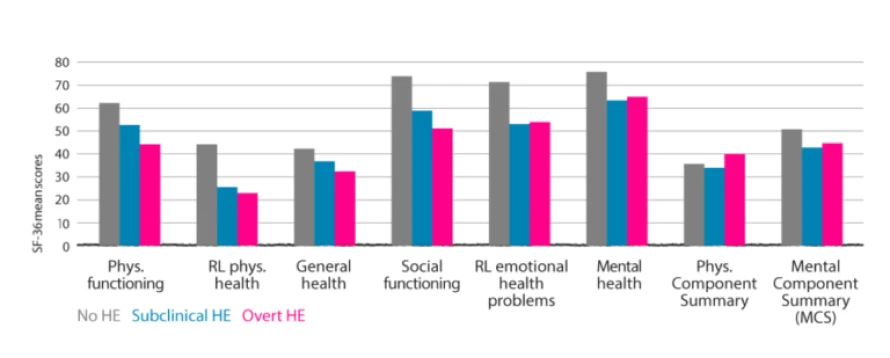Hepatic encephalopathy
Patient quality of life
The attention and cognitive deficits, impairment of motor abilities, deficits in visual performance and neuropsychiatric symptoms associated with HE and even minimal HE can impair every life sphere including working ability, fitness to drive, leisure activities (reading, watching TV, playing games etc.), sleeping, psychiatric comorbidity and social contact (i.e., listening and following the context of a discussion).1-6
- Studies have shown that overt HE negatively affects both physical and mental aspects of quality of life, whereas minimal HE affects mainly the mental aspects, independently of liver disease severity.7,8
- Minimal MHE can have a far-reaching impact on patients’ quality of life, their ability to function in daily life and the rate of progression to overt HE. Importantly, MHE has a profound negative impact on the ability to drive a car and may be a significant factor behind motor vehicle accidents.9
The impact of HE on patient quality of life
A study helped to define the effects of HE on health-related quality of life (HRQOL) in 60 patients with advanced liver disease. HRQOL was measured with the Short Form-36 questionnaire and scores were compared according to liver disease severity and to the presence and degree of HE.
Increasing severity of liver disease (based on the Child-Pugh score), a history of hospitalizations, and a history of ascites were associated with decreased physical component summary scores but not mental component summary scores. Patients with HE (both overt and subclinical) had decreased physical and mental component summary scores compared to patients without encephalopathy.7

1. Weissenborn K et al. Attention deficits in minimal hepatic encephalopathy. Metab Brain Dis. 2001;16(1-2):13-9.
2. Weissenborn K et al. Neuropsychological characterization of hepatic encephalopathy. J Hepatol. 2001;34(5):768-73.
3. Córdoba J et al. High prevalence of sleep disturbance in cirrhosis. Hepatology. 1998;27(2):339-45.
4. Schomerus H, Hamster W. Quality of life in cirrhotics with minimal hepatic encephalopathy. Metab Brain Dis. 2001;16(1-2):37-41.
5. Wein C et al. Minimal hepatic encephalopathy impairs fitness to drive. Hepatology. 2004;39(3):739-45.
6. Bianchi G et al. Hepatic encephalopathy and health-related quality of life. Clin Liver Dis. 2012;16(1):159-70.
7. Arguedas MR et al. Influence of hepatic encephalopathy on health-related quality of life in patients with cirrhosis. Dig Dis Sci. 2003;48(8):1622-6.
8. Prasad S et al. Lactulose improves cognitive functions and health-related quality of life in patients with cirrhosis who have minimal hepatic encephalopathy. Hepatology. 2007;45(3):549-59.
9. Bajaj JS. Minimal hepatic encephalopathy matters in daily life. World J Gastroenterol. 2008;14(23):3609-15.